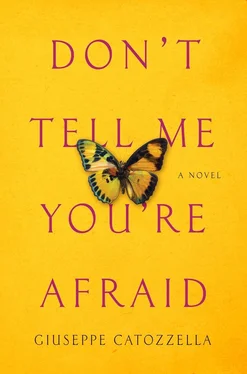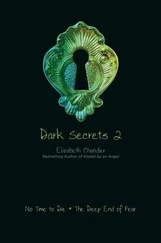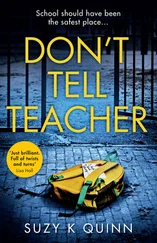Then too, in Tripoli there’s the sea. The city, like Mogadishu, is awash with the scent of the sea. That’s why my energy returned, the desire to live and take pleasure in life. But there too, as in Mogadishu, I could not go to the sea; if they caught me I would be arrested. I would have to wait; I would just have to wait to get to Italy.
And so, along with food, the urge for companionship came back, to eat together, tell one another our stories, take turns planning our future. And talking. Words are lifesavers. And the words uttered by far the most, by each in his own distorted accent, were “Italy” and “Lampedusa.”
Never in my life have I loved talking as much as I did during the long period I spent in Tripoli. We formed teams according to nationality and challenged one another at cards: Each taught the others their own ways of playing, and then we argued over the rules. We taught one another words in our respective languages. We talked about our families, our homes, our parents, our brothers and sisters, our sweethearts. Our favorite dishes. We wondered how awful the food would be in Europe. We wondered what the people would be like. We imagined the houses we would have. The kitchens. The bathrooms with a tub and shower. Carpeting on the floor, or parquet. And what we would do, our work. I would be an athlete. There were some who dreamed of being lawyers, some teachers, others nurses or pediatricians. Some just wanted a family. We passed the time together, talking about our respective plans. And we also thought about practical things. Like how we would leave. For the last time.
The routine for crossing the sea was the usual. You arrange for the money for the voyage; then you wait. You wait for them to come and call you and tell you, with no time to prepare, you’re leaving in an hour.
You know that anything can happen at sea, but you don’t think about it. All you think about is the destination. If all goes well, in two days, two and a half at most, you’ll be in Lampedusa. But anything can happen. The sea is a bigger obstacle than the Sahara; the traffickers tell you that when you contact them.
I went with two other Somali girls.
“Prepare for the worst,” they tell you. “What you’ve faced so far is nothing. By comparison, the Sahara is a cakewalk,” they tell you. And you don’t believe it. It can’t be true. What I had faced up to that point was hell, nothing could be worse. Besides, the sea, my sea, couldn’t hurt me. We’d had a rendezvous planned for nearly twenty years now. I knew it and the sea knew it. In Italy, at last, we would meet up. One of the first things I’d do was plunge into it and enjoy that vast, welcoming immensity.
The boats are old pieces of junk that should be used only for scrap iron. The sea’s power is capable of engulfing them at any moment. For us tahrib, however, they were pure gold, luxurious cruise yachts. In addition to engine failures, the trafficker might get lost; the damn GPS could fail or make a mistake. Or we might even run out of gas; it seems impossible but it happens: Sometimes they miscalculate the amount of fuel they need, or they unintentionally extend the route and are left empty. You know that anything can happen but you don’t think about it; what you think about is the destination.
There you are, waiting for that moment for weeks or months, and when it comes you’re caught unprepared. Every time. There’s no way to prepare; I don’t know anyone who was ever prepared. Not in terms of what you need to bring with you: There are only two or three things and they are always with you. No, prepared in your head. Prepared for the fact that it’s the end of the Journey.
You don’t know if it will be morning, afternoon, or night. It’s usually at night, but you can never tell; it depends on the trafficker’s strategy. There are some who decide on midnight, so they can be offshore before the light. Some opt for the afternoon, so they can already be far out to sea by daybreak. Others instead choose the early morning, so they can cover a long distance and be far away from Africa when darkness falls, and therefore less visible.
I was hoping my voyage would be in the afternoon; it seemed like a quieter time to start out.
I was jittery; Hodan had told me that she would promptly send the money I needed, twelve hundred dollars, to the address I had given her. I couldn’t wait.
It didn’t even take a month. I don’t know how Hodan came up with the money, but I didn’t care; it was one of the things I’d ask her once I got there.
My turn came a few days later, on January 12, 2012. It wasn’t in the afternoon. It was in the morning, at 4:00 a.m. I was awakened and told to leave.
But my trip lasted only three hours. That’s how short-lived my joy at being at sea was. We hardly had time to board — seventy of us in a rubber dinghy that was too small — when we had to turn back. The air that morning was electric; the sun wouldn’t rise until two hours later and the excitement among us was so tense you could cut it with a knife. We settled into our places in silence, some on the outside, some in the middle. I ended up at the stern on the outside next to the traffickers; because I was skinny I squeezed in between two hefty Nigerian guys whose arms were as big as my legs.
But it was a fiasco.
A doomed attempt: The dinghy began to take on water almost immediately. The traffickers swore in Arabic and for a while they kept going anyway. Then they stopped. “We’re turning back,” they told us. The end of the line, the end of our dreams and hopes.
“We were lucky to notice it early on, still close to the coast,” they said. “If we were midway there we’d have sunk. We’d have all drowned.” That’s what they told us.
Only three hours.
Then back to Tripoli.
And nobody gives you your money back.

NOW HERE I AM IN TRIPOLI, waiting; it’s been two and a half months since we turned back. It’s March 31, 2012. Only four months till the opening ceremony of the London Olympics and I know that I can still make it.
Three days after I returned to the apartment in the eastern outskirts of the city, a new girl arrived: Nigist, an Ethiopian. She was nervous, like all newcomers, but also elated: She had conquered the monster of the Sahara; she hadn’t let it scare her. We became friends. She’s like me: She’s my same age and has the same build. If you ask me, we look alike, even though she says I’m prettier than she is. It’s not true; I think she’s prettier. I found her a place next to my mat. I didn’t want her to end up in the clutches of some mean woman whose heart had been hardened by the Journey.
I went over my story a number of times with Nigist. She recognized me. She had seen me on TV nearly four years ago, at the China Olympics, and since then, she says, she’s never forgotten my face: my gentle, radiant smile, she says.
At first, like Abdullahi, she couldn’t believe it was me. That I was there, like her, a tahrib like everyone else. A needy refugee. The second day she asked me. And I’ve never been more grateful to anyone. Nigist brought me back to life; that’s why I decided to protect her. If she hadn’t recognized me, I wouldn’t have remembered who I was. It had been too long since I last looked in the mirror. The truth is that was something I didn’t want to do. Whenever I happened to come near a reflective surface, I would avert my gaze. I hadn’t seen my face in eight and a half months, except through the reactions of others when they looked at me.
That is why I will be forever grateful to Nigist. And why I like to tell her my story, again and again, almost every day. We must have had the same conversation — how many times? Twenty, thirty? Maybe more. Each time she asks me the same questions, or asks me new ones, and we find ourselves laughing at the same incidents. When Alì stole the candies that Aabe had saved for the feast of Eid, which marks the end of Ramadan, and as punishment Aabe made him eat them all, causing him to get diarrhea. When I ran in the stadium at night and imitated the noise of the crowd by taking a big breath and roaring: aaaaarrghhhh . When Alì fell into the big pool of excrement at the first race I won. When I told a reporter after the race in Beijing that I would have been happier if people had applauded me because I finished first and not last, and he’d burst out laughing in front of the TV camera. When Abdi actually thought that the aquarium in China was magical, and I confirmed it, and he fell for it. Then too the eucalyptus. When Alì climbed to the top and stayed there until he was weak from hunger. Like a monkey.
Читать дальше





![Ally Carter - [Gallagher Girls 01] I'd Tell You I Love You But Then I'd Have to Kill You](/books/262179/ally-carter-gallagher-girls-01-i-d-tell-you-i-lo-thumb.webp)







